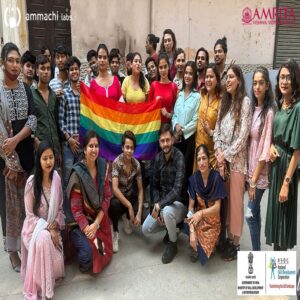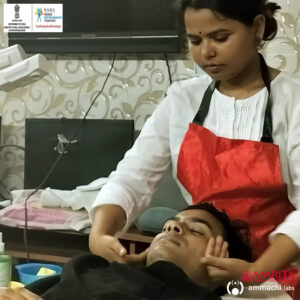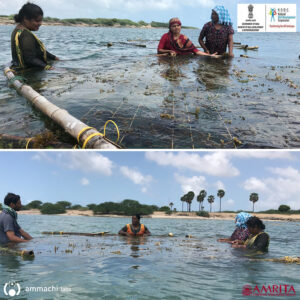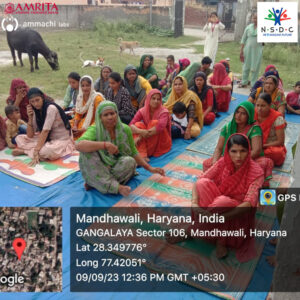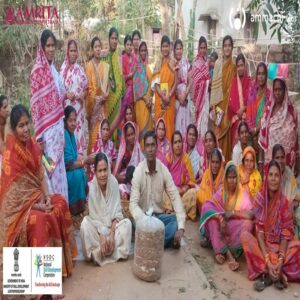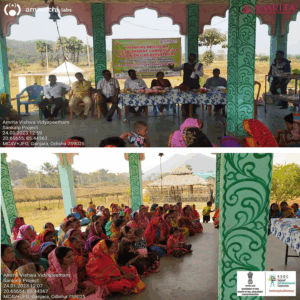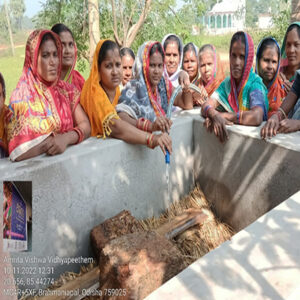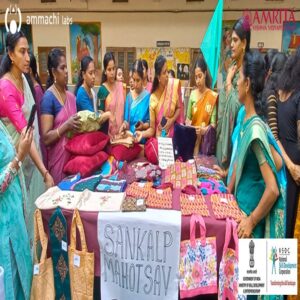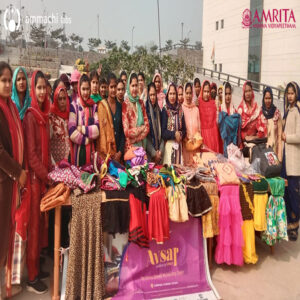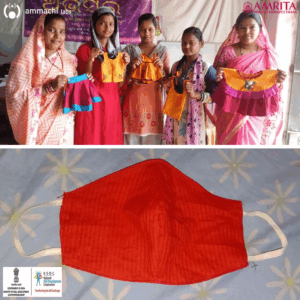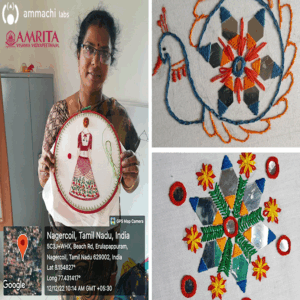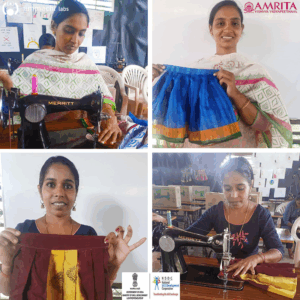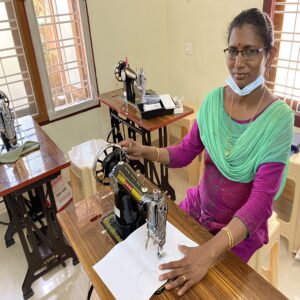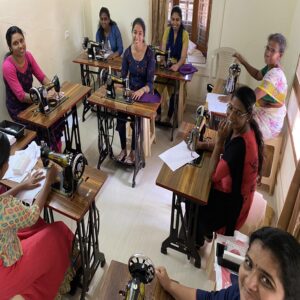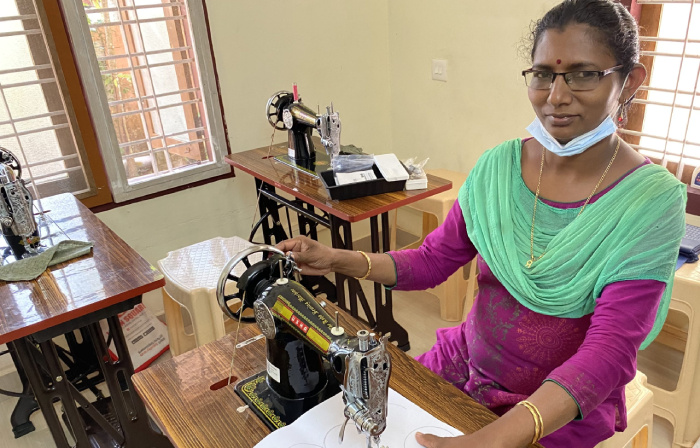
Project Title:
SANKALP Project: Skills Training for Independent Lives
Dept./ Centre/ Lab:
AMMACHI Labs
Project Incharge(s):
Principal Investigator: Dr.Bhavani Rao, Director-AMMACHI Labs
Co-Principal Investigator: Bri. Karunyamrita Chaitanya, Srividya Sheshadri
Dates:
April – 1, 2022
Funding Agency:
Ministry of Skill Development and Entrepreneurship (MSDE), Government of India
Nearly 20 years ago, the 2004 Indian Ocean Earthquake and Tsunami destroyed homes, shattered lives and ruined livelihoods. As one of the many responses to the crisis, Amma and the MA Math started the AmritaSREE program, a community-based Self-Help Groups initiative, to help the women impacted rebuild their lives. Three years ago, the Covid pandemic struck. While the Tsunami locked us out, the Covid pandemic locked us in. Memories of its trail of loss are still fresh in our minds. The pandemic hit hard rural women and transgender individuals in India. Apart from the tragic health impacts, job opportunities dwindled, pushing them further into economic uncertainty. The transgender community, already marginalized, faced heightened discrimination, making it even harder to secure employment or access social services. To help them bide the storm, Amma supported over 250,000 women through the pandemic by providing cash support, food and clothing, and ration supplies, twice a year. It was Amma’s desire to build resilience and preparedness in these communities, addressing the challenges revealed by Covid, to strengthen the women’s Self-Help Group structures through diversification of livelihoods. Under her guidance and as part of an initiative led by the Government of India’s Ministry of Skill Development and Entrepreneurship, called “Avsar SANKALP – Skill Acquisition and Knowledge Awareness for Livelihood Promotion,” Amrita University provided vocational training to 4,500 women and transgender individuals.
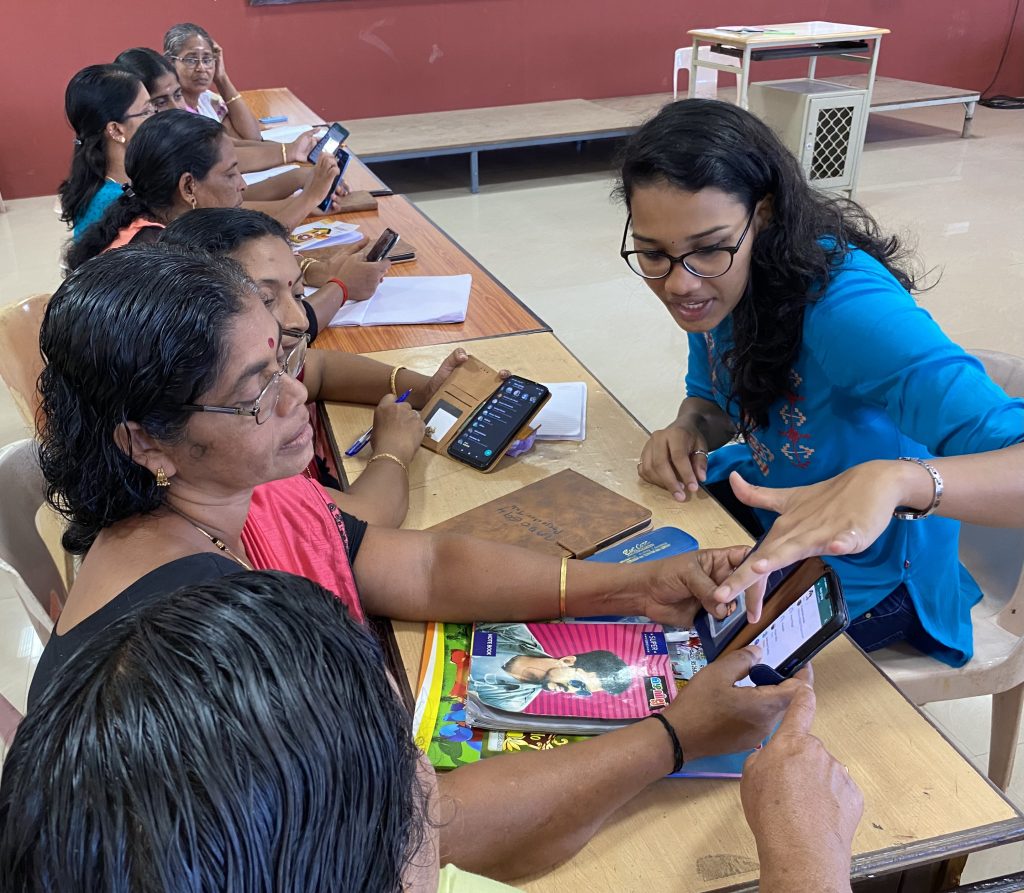
Amrita’s Center for Women’s Empowerment and Gender Equality’s study on SHGs during COVID
Amrita Vishwa Vidyapeetham’s implementation of SANKALP was designed based on a study conducted by its Center for Women’s Empowerment and Gender Equality. During the height of the COVID pandemic, the Center initiated a comprehensive study to explore the impact of the nationwide lockdown on self-help groups (or SHGs). This study shed light on the plight of thousands of SHGs that came to a halt due to the inability to convene regularly and carry out their income generating activities. In response to these multifaceted challenges, the centre designed and implemented a comprehensive intervention approach that served as the backbone of Amrita’s delivery of the Sankalp initiative.
Amrita Overall Approach and States of Implementation
Amrita Vishwa Vidyapeetham’s SHG recovery model offers an enriched blend of vocational education and training designed to empower groups and individuals not only economically, but also socially and psychologically. It integrates vital components such as life enrichment education, entrepreneurship development, digital literacy, SHG leadership, and governance. This approach aims to rejuvenate and strengthen existing SHGs, and initiate new groups by preparing individuals for collective enterprises. Amrita University, guided by over a decade of experience in skill development for rural communities, took this Sankalp program to six states in India – Kerala, Tamil Nadu, Odisha, Haryana, Delhi, and Uttar Pradesh.
Courses Offered
Under Amrita’s Sankalp program, most participants started their journey by attending a pre-training workshop to assist them in selecting the job roles that would best support their business ventures within their respective communities. Overall, Amrita offered an array of over 40 courses, all officially approved by the Ministry of Skill Development and Entrepreneurship and aligned with the National Skill Qualification Framework. Each of the diverse courses offered unique growth opportunities for women and transgender individuals participating in the training. The participants in the Amrita SANKALP project enthusiastically embarked on the courses they selected, which included: organic farming, mushroom cultivation, seaweed cultivation, tailoring, hand embroidery, beauty therapy, general duty assistance, and beekeeping among many others.
Pedagogy: The aim and objective of any truly comprehensive and sustainable project should not only beknowledge and skill acquisition, but also the betterment of society and human flourishing. To achieve this, we turn to the timeless principles of Sanatana Dharma:
Satyam: To train in knowledge that is scientific and skills that are technical for livelihoods and gainful employment including vocational skills, digital literacy and finance, e-markets and communication, entrepreneurship and business skills.
Shivam: To build back a better life not just for oneself, but for all. Taking ownership and leadership for positive change–to give back to society and bring auspiciousness everywhere.
Sundaram: To cultivate beauty in all that we do, focusing on quality and aesthetics. The beneficiaries learned to unleash their creativity and bring joy to themselves and those around them.
Empowering Lives
This initiative has been more than just a training program; it created a transformative journey towards empowerment and economic growth, enabling women and transgender individuals to carve out their destinies, contribute to their communities, and be the change-makers of tomorrow. Amrita is philosophy, which underlies both its pedagogy and training methodology, is unique. This philosophy is outlined below.
Methodology
Amrita’s training methodology went beyond just delivery of the theory and practice of vocational skills. Courses were delivered through an integrated and blended learning format bringing together classroom learning, practical application, and digital literacy.The curriculum, designed for empowerment, included vocational and business skills for knowledge acquisition towards gainful employment as well as life skills (also called L.E.E. & SMART SHG) for the individual, and collective skills to build community cohesion, functioning, and overall well being. Training was delivered through a digital platform, tailored for learners with low literacy and digital skills. This platform offered interactive, user-friendly content. Alongside these lessons, it built digital literacy by incorporating the latest technologies and e-content in an easily usable format. In the LEE sessions, students developed their interpersonal skills. They engaged in activities or watched short films on pressing social issues and then discussed their thoughts and observations in small groups before sharing them with the larger class. These discussions provided a safe space for students to express themselves, learn from one another, and gain confidence in discussing sensitive issues. These sessions covered a wide range of important topics, including time-management, sanitation, health, substance abuse, nutrition, women’s health, child abuse, human trafficking, and more. We also conducted activities called “Ideal Village” and “LEE in the Community,” during which students were given a chance to address real issues in their communities. In the “Ideal Village,” students worked in groups to envision what their perfect village might look like, highlighting the differences between them and their current surroundings. This reflection helped them identify problem areas that can be addressed with group support. In the “LEE in the Community,” students collaborated to take action on community issues they are passionate about. This demonstrated both their increased awareness and capacity to address personal and social concerns.
Examples of LEE in the Community
SMART SHG Component
An additional, remarkable aspect of this initiative is the “SMART SHG” intervention. SMARTSHG is all about fortifying the financial health and collective strength of SHGs. It achieves this through a holistic, three-pronged approach aimed at:
All graduates who successfully completed the SMART SHG course received MSDE certification and received guidance by Amrita University to form collective enterprises.
Remote Monitoring Methods (App)
To track the progress of the Amrita SANKALP project, the Amrita Sankalp App, a customised, daily-reporting and monitoring tool, was developed. Through this mobile application, training centre staff and students reported on the progress and quality of the classroom sessions, and reported general observations from the day’s events, self-perceived challenges, and successes. This App enabled remote monitoring of the Amrita-Sankalp project, and ultimately helped to evaluate the extent that the prescribed training methodology was implemented in practice.
Starting Businesses and Group Empowerment
The last mile, or capstone of the program, includes mentorship, access to resources, networking opportunities, and guidance on business development. 150 businesses have been registered so far as enterprises under the Ministry of Micro, Small & Medium Enterprises, which offers them both formal recognition as well as access to various benefits and incentives available to MSMEs by the government.
Overall Numbers
Diverse Training Included
